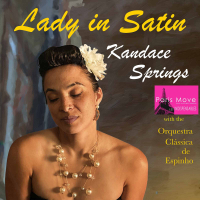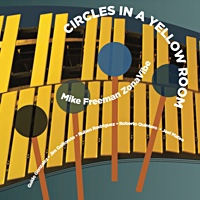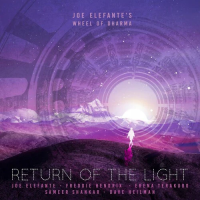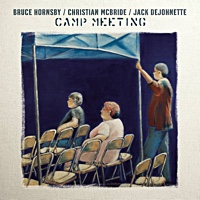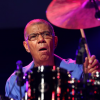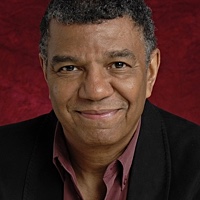Home » Search Center » Results: Russell Perry
Results for "Russell Perry"
The Soul Jazz Organ of Jimmy Smith, Baby Face Willette, Shirley Scott (1957 - 1965)

by Russell Perry
Rarely has a jazz instrument been so completely redefined as the organ was at the hands of Jimmy Smith. In his wake, the Hammond B3 organ gained wide-spread popularity and attracted a suite of talented adherents. B3 players Jimmy Smith, Baby Face Willette and Shirley Scott in this hour of Jazz at 100 as we continue ...
The Soul Jazz of Saxophonists (Donaldson, Newman, Turrentine) and Pianists (Hancock, Lewis, McCann) (1958 - 1969)

by Russell Perry
Soul Jazz developed in the late 1950s and become a staple of ghetto jukeboxes. Its catchy lines, heavy beat and blues-influenced phasing became a popular alternative to other jazz forms evolving in the 1960s. In addition to the guitar and organ led ensembles that have been featured in the previous two hours of Jazz at 100, ...
The Soul Jazz Guitar of Montgomery, Burrell and Green (1960 - 1965)

by Russell Perry
Hard bop created a comfortable setting for a suite of great blues-influenced guitar players who led the way toward soul jazz. Several of these players were from the mid-west -Wes Montgomery from Indianapolis, Grant Green from St. Louis and Detroit's Kenny Burrell. The next three hours of Jazz at 100 will present music from the 1960s ...
Sons of Miles – Shorter, Hancock, Williams (1964 - 1968)

by Russell Perry
During the five-year tenure of Miles Davis's Second Great Quintet (1963—1968), Wayne Shorter, Herbie Hancock and Tony Williams were very active on their own projects, many of which included Ron Carter. Several of the resulting releases are classics of the period and laid the foundation for their significant careers after the Quintet broke up in 1968. ...
Miles Davis and the Second Great Quintet (1963 - 1968)

by Russell Perry
Miles Davis, through his adoption of modal music, participated in the gradual liberation that resulted in the free music of the jazz avant-garde--liberation from chord changes, from rhythm, from harmony, from melody, from structure. Yet, although he continued to explore broadly, he was public in his discomfort with free jazz. Despite this reluctance, the new quintet ...
The Arrival of Joe Henderson (1963 - 1967)

by Russell Perry
Joe Henderson may have been the most significant tenor saxophonist to emerge in the 1960s. Gary Giddins wrote that he is ..."an irresistibly lucid player, whose adroitness in conjuring stark and swirling riffs contributed immeasurably to two of the most durable jazz hits of the '60s, Horace Silver's 'Song for My Father' and Lee Morgan's 'The ...
The Hard Bop / Avant-Garde Synergy of Andrew Hill (1963 - 1965)

by Russell Perry
Blue Note Records in the 1960s released such iconoclastic projects as Cecil Taylor's Unit Structures and Eric Dolphy's Out to Lunch, but the label was best known for music on the Art Blakey--Horace Silver axis. As Ted Gioia has noted ..."other, less radical Blue Note releases showed that there could be a meeting point between hard ...
The Jazz Avant-Garde in the 1960s (1960 - 1966)

by Russell Perry
Nurtured in the seminal recordings of Ornette Coleman and Cecil Taylor in the mid to late 1950s, the jazz avant—garde came into its own in the 1960s with their continuing creations, those of John Coltrane already featured in this program and those of next generation players, Joe Harriott and Albert Ayler. Defining statements of the free ...
Two Different Fates - Jackie McLean & Tina Brooks (1960 - 1963)

by Russell Perry
Fate could not have treated Blue Note saxophonists Tina Brooks and Jackie McLean more differently. While McLean released nine LPs for Prestige and two dozen for Blue Note between 1956 and 1967, only one of Tina Brooks' four Blue Note sessions was released in his lifetime. Yet their collaborations on McLean's Jackie's Bag and the unreleased ...
The Authenticity of Rahsaan Roland Kirk (1961 - 1972)

by Russell Perry
Roland Kirk, who began recording in 1956, had been an ideal sideman for Charles Mingus, appearing on the 1961 release Oh Yeah. In the 1960s, he established himself in the first tier of jazz players with a series of well-received records for Mercury and Limelight before settling into a decade-long relationship with Atlantic. “A ...


